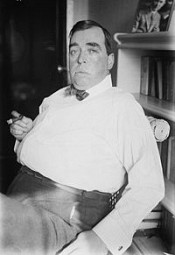Ashford Angela

Irvin Shrewsbury Cobb (June 23, 1876 – March 11, 1944) was an American author, humorist, and columnist who lived in New York and authored more than 60 books and 300 short stories. Cobb was the second of four children born to Kentucky natives in Paducah, Kentucky. His grandfather Reuben Saunders, M.D., is credited with discovering in 1873 that hypodermic use of morphine-atropine halted cholera. Cobb was raised in Paducah, where the events and people of his childhood became the basis for much of his later works . Cobb was educated in public and private elementary schools and then entered William A. Cade's Academy intending to pursue a law career. When he was 16, his grandfather died and his father became an alcoholic. Forced to quit school and find work, he began his writing career. He started in journalism on the Paducah Daily News at age seventeen, and became the nation's youngest managing news editor at nineteen. He later worked at the Louisville Evening Post for a year and a half. His firsthand account in Exit Laughing, details the saga of the Kentucky Governor William Goebel, who killed a man, exploited the split Democratic Party in Kentucky, and was assassinated in 1900. Moving to New York in 1904, Cobb was hired by the Evening Sun. It sent sent him to Portsmouth, New Hampshire to cover the Russian-Japanese peace conference. His dispatches from the negotiations, focusing on the personalities involved (including President Theodore Roosevelt) were published across the country under the title "Making Peace at Portsmouth". They earned him a job offer from Joseph Pulitzer's New York World that made him the highest-paid staff reporter in the United States.[1] Cobb covered World War I for the Saturday Evening Post, and wrote a book in 1915 about his experiences called Paths of Glory. He wrote numerous series in periodicals and also collaborated on dramatic productions. Several of Cobb's stories were made into silent films. He also wrote the screen titles for a couple more, including the Jackie Coogan vehicle Peck's Bad Boy (1921). When sound came in, more of his stories were adapted into films, including The Woman Accused (1933), starring a young Cary Grant. John Ford twice made films based on Cobb's Judge Priest stories: Judge Priest (1934), featuring Will Rogers in the title role, and The Sun Shines Bright (1953), based on the short stories "The Sun Shines Bright", "The Mob from Massac", and "The Lord Provides". Cobb also had an acting career, appearing in 10 films between 1932 and 1938, with starring roles in such movies as Pepper and Everybody's Old Man (1936). He was host of the 6th Academy Awards in 1935.[2] Cobb has been described as having a round shape, bushy eyebrows, full lips, a triple chin, and always having a cigar in his mouth.[1] He married Laura Spencer Baker of Savannah, Georgia. His daughter Elisabeth Cobb Rogers (born 1902) was an author in her own right. She published the novel She Was a Lady and My Wayward Parent (1945), a book about her father. Her first husband was Frank Michler Chapman, Jr., son of the ornithologist Frank Michler Chapman. Cobb's granddaughter is "Buff" Cobb (born Patricia Chapman on October 19, 1928 in Florence, Italy). She was a TV personality of the early 1950s, and second wife of journalist Mike Wallace.[3] When Cobb died in New York City in 1944, his body was sent to Paducah for cremation. His ashes were placed under a dogwood tree. The granite boulder marking his remains is inscribed "Irvin Shrewsbury Cobb 1876-1944 Back Home". Cobb is best remembered for his humorous stories of Kentucky local color. These stories were first collected in the book Old Judge Priest (1915), whose title character was based on a prominent West Kentucky judge named William Pitman Bishop. Among his other books of humor are Speaking of Operations (1916) and Red Likker (1929). Joel Harris wrote of these tales, "Cobb created a South peopled with honorable citizens, charming eccentrics, and loyal, subservient blacks, but at their best the Judge Priest stories are dramatic and compelling, using a wealth of precisely rendered detail to evoke a powerful mood."[1] Cobb also wrote short stories in a horror vein, such as "Fishhead" (1911) and "The Unbroken Chain" (1923). "Fishhead" has been cited as an inspiration for H. P. Lovecraft's The Shadow Over Innsmouth, while "The Unbroken Chain" was a model for Lovecraft's "The Rats in the Walls". Douglas Fairbanks / William C. deMille (1929) · William C. deMille (1930) · Conrad Nagel (1930) · Lawrence Grant (1931) · Lionel Barrymore / Conrad Nagel (1932) · Will Rogers (1934) · Irvin S. Cobb (1935) · Frank Capra (1936) · George Jessel (1937) · Bob Burns (1938) · None (1939) · Bob Hope (1940) Complete List · (1929–1940) · (1941–1960) · (1961–1980) · (1981–2000) · (2001-present)
do you like this author?
What readers are saying
What do you think? Write your own comment on this book!
write a commentWhat readers are saying
What do you think? Write your own comment on this author!
write a commentBook list

Daisy Ashford: Her Book
Series:
Unknown
Year:
Unknown
Raiting:
4/5
Originally published in 1920. This volume from the Cornell University Library's print collections was scanned on an APT BookScan and converted to JPG 2000 format by Kirtas Technologies. All titles scanned cover to cover and pages may include marks notations and other marginalia present in the original volume. --This text refers to an alternate Paperback edition.
Show more
add to favoritesadd In favorites
Book list

Daisy Ashford: Her Book
Series:
Unknown
Year:
Unknown
Raiting:
4/5
Originally published in 1920. This volume from the Cornell University Library's print collections was scanned on an APT BookScan and converted to JPG 2000 format by Kirtas Technologies. All titles scanned cover to cover and pages may include marks notations and other marginalia present in the original volume. --This text refers to an alternate Paperback edition.
Show more
add to favoritesadd In favorites
What readers are saying
What do you think? Write your own comment on this author!
write a commentif you like Ashford Angela try:
readers also enjoyed
What readers are saying
What do you think? Write your own comment on this author!
write a commentif you like Ashford Angela try:
readers also enjoyed
Do you want to read a book that interests you? It’s EASY!
Create an account and send a request for reading to other users on the Webpage of the book!

